Team finalists
Learn more about the work of our shortlisted teams and services.
Excellence in improving use of resources
Improving our use of resources is one of our strategic objectives. This award will go to a team or service who identified a need to improve their use of resources and can describe how they tackled the problem and how the outcome was evaluated.
Winner
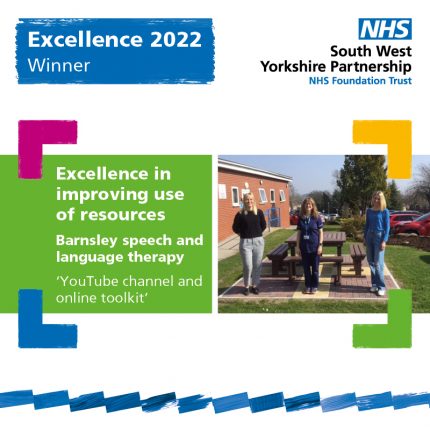 Barnsley speech and language therapy, ‘YouTube channel and online toolkit’
Barnsley speech and language therapy, ‘YouTube channel and online toolkit’
The service’s YouTube channel and online toolkit were developed and launched at the start of the Covid-19 pandemic. The channel has videos that demonstrate interventions, therapy approaches, and communication strategies as well as videos of young people talking about what supports them to communicate well, for example young people who stammer. The team have also developed a bank of training resources in order for the service to continue to deliver communication training online and through webinars. The online toolkit allows parents, professionals and services to access resources that help them when doing therapy interventions as well as offering helpful advice on supporting children’s communication.
“We have received excellent feedback from service users and professionals using our channel and toolkit. As well as helping to continue with our service offer during the pandemic, we have an innovative and expanding resource to use in the future.”
Janet Whiting
Clinical manager
Runner up
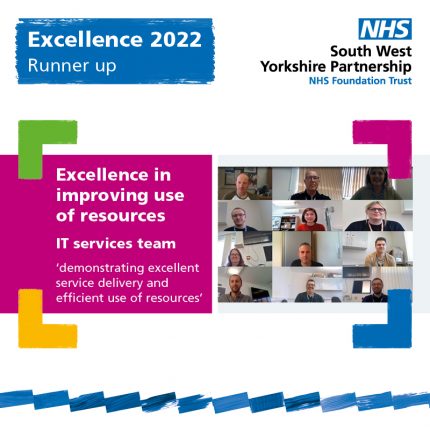 IT services team, ‘demonstrating excellent service delivery and efficient use of resources
IT services team, ‘demonstrating excellent service delivery and efficient use of resources
The Trust’s IT team has made wide-reaching changes in support of both maintaining and enhancing the IT capabilities and digital services across the Trust. The team have made important enhancements to cyber security – ensuring that all Trust staff can continue to work safely and securely. Alongside this, they made sure staff could continue to work effectively by connecting to the Trust network remotely through VPN. Accreditation of the Trust’s @swyt.nhs.uk email platform was another key achievement, working closely with NHS Digital to ensure compliance with accreditation standards. All of this has been achieved whilst balancing day-to-day service delivery to a consistently high standard.
“The IT team have demonstrated significant collective and personal resilience throughout these challenging and unprecedented times, not only in maintaining services but in also making significant improvements, benefitting all.”
Paul Foster
Head of service
Highly commended
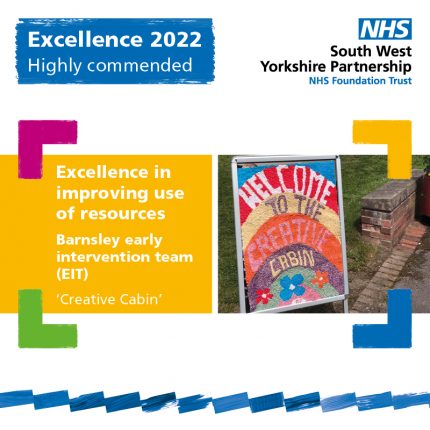 Barnsley early intervention team (EIT), ‘Creative Cabin’
Barnsley early intervention team (EIT), ‘Creative Cabin’
The Creative Cabin is a therapeutic art and craft group taking place in the log cabin on the Kendray Hospital site. Most of the group’s resources come from donations and foraging in local woods, parks, and even beaches. The group sell their craft creations at fairs and money from this is then used to either run workshops or field trips with the group. Each workshop and field trip is discussed with service users to help them with their confidence and decision making skills. Service users who have taken part in the group have gone on to try out further creative courses in the wider community.
“Fab and friendly, everyone makes me feel welcome.”
Service user
Finalists
Calderdale core CAMHS team, ‘management of resources with increasing demand’
The team successfully implemented the THRIVE model of working to assist with managing demand and capacity. Through completing larger initial assessments and undertaking increased screening and outcome measures at the initial appointment, the needs of young people are better met and families are assessed thoroughly to ensure that the correct service and practitioner is identified. Before the THRIVE model was in place, waiting times were approximately 6 months. On implementation of this model, waiting times have reduced to 2-3 months. Working within THRIVE principles means interventions are person centred through allowing choice, measured goals are set, and conversations about discharge are happening earlier.
“I’m proud of the successful implementation of the THRIVE model within Calderdale CAMHS which is person centred and links to a needs-led service being offered. “
Joanne Spinks
Senior mental health practitioner/lead clinician
The acute therapy team (physiotherapy), ‘implementation of Boxchill as an intervention in reducing agitation amongst service users and to prevent the need for seclusion and restraint’
BoxChill is the therapeutic use of boxing gloves and pads undertaken as an intervention with trained staff to reduce agitation levels. BoxChill is offered before the patient’s agitation levels escalate to the point of verbal aggression or violence, avoiding the need for restraint and/or seclusion. Staff members have provided a training session on the use of Boxchill which is now being rolled out throughout inpatient wards. This intervention has a strong evidence base supporting its use amongst people with agitation and mental health, and physiotherapy staff within the team have worked endlessly to ensure that the intervention is safe, appropriate and beneficial to the Trust’s service users.
“The use of restraint and seclusion is considered restrictive practice which implementation of BoxChill can reduce. The team has put their all into creating a less restrictive training package and intervention which will be highly valued.”
Charlotte MacGregor
Occupational therapist
Excellence in responding to the COVID pandemic (team)
This award will be presented to a service or team who can evidence excellence in dealing with the pandemic, and its effect on service users, staff and the wider community.
Winner
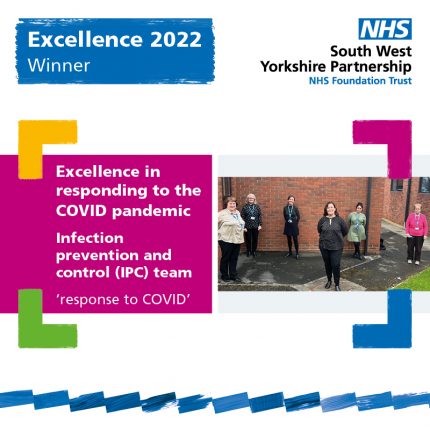 Infection prevention and control (IPC) team, ‘response to COVID’
Infection prevention and control (IPC) team, ‘response to COVID’
From the start of the pandemic the infection prevention and control team have worked tirelessly and always been available to answer any queries. They have kept staff and teams up to date, ensuring everyone had the right information and equipment to stay safe. Both service users and staff have been provided with updated guidance and resources to stay informed, and the team managed to alleviate fears and worries while facing the uncertainty of the pandemic themselves. Throughout they have worked as a close team ensuring to be open, honest and transparent in all their communication.
“From day one the team have been there for all of us. They worked tirelessly (and still do) to ensure that they were there to answer our queries, supporting us and keeping us safe.”
Laura Oates
Team manager
Runner up
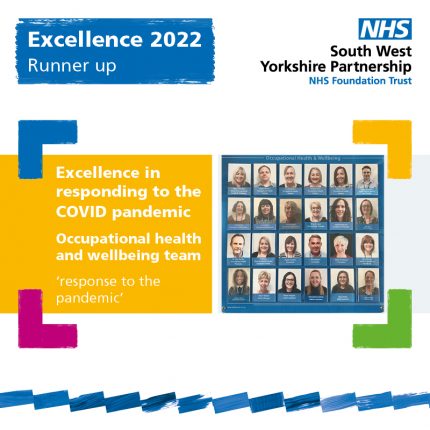 Occupational health and wellbeing team, ‘response to the pandemic’
Occupational health and wellbeing team, ‘response to the pandemic’
The occupational health team have managed throughout the pandemic to establish new ways of working as a team without compromising quality or accessibility. This included setting up a COVID helpline to provide advice and support to staff and managers as issues and guidance changed at a rapid pace, undertaking staff risk assessments, and supporting vaccination clinics including by signing off peer to peer vaccinators to deliver vaccination. The team have worked tirelessly for 2 years implementing support for staff and managers whilst continuing to deliver the day job, keeping up to date with ever-changing guidance to support the advice line and keep managers and staff informed.
“The occupational health team have shown tremendous commitment and gone the extra mile to support our staff through unprecedented times. They demonstrated our Trust values throughout and played a huge part in the vaccination programme. I am extremely proud of them.”
Lindsay Jensen
Interim director of HR and OD
Highly commended
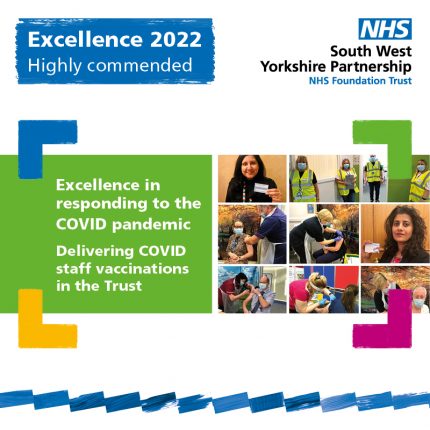 Delivering COVID staff vaccinations in the Trust
Delivering COVID staff vaccinations in the Trust
COVID-19 staff vaccinations began on 12 January 2021 at the Trust, following national approval for the Trust to become a ‘hospital hub’ to provide first and second doses of the vaccine. Throughout the delivery of vaccinations, the programme team (vaccine bronze group) used data and insight from staff to recognise areas within the Trust where staff vaccination uptake was lower. This meant tailored support and communications could be provided to these staff groups. Over 1,100 Trust and social care staff shared their experiences of having their vaccine at the Trust. Findings showed that 99% of staff were very satisfied/satisfied with how safe they felt at the hubs and 98% with the efficiency of the service.
“Everybody was so helpful. I got all the information I needed. All of my questions were answered. I felt very secure and safe.”
Staff member
Finalists
The performance and business intelligence team, ‘excellence in information intelligence’
The team have designed, developed and delivered key data and information to support the Trust’s pandemic response. They have worked tirelessly for two years over 7 days a week to ensure that the Trust command structure had timely and accurate information to support planning, including absence and testing data. In addition to this, they stepped up to work in testing and vaccination centres not only doing their day jobs of data management and analysis but being key parts of the teams on the ground, including supporting inpatient vaccinations. The team have played an invaluable part in ensuring the Trust was prepared and responsive to the challenges of the last two years.
“Thank you for your excellent work and dedication to the organisation, its patients and staff. You have ensured the Trust has been able to steer a safe course through the pandemic and onwards to recovery and restoration.”
Julie Williams
Assistant director – corporate governance, performance and risk
Excellence in improving health
Improving people’s health and wellbeing is one of our strategic objectives. This award is for a piece of work that can evidence how it has improved the health and wellbeing – or reduced health inequalities – for people who use our services, their carers or people who live in our local area. It could also be for work that has improved the health and wellbeing of our staff.
Winner
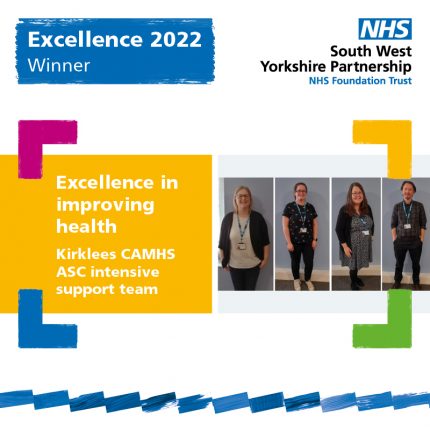 Kirklees CAMHS ASC intensive support team (IST)
Kirklees CAMHS ASC intensive support team (IST)
The Kirklees CAMHS ASC intensive support team was commissioned as a result of the NHS England Transforming Care programme, which aims to transform services and support for children, young people and adults with a learning disability and/or autism who display behaviour that challenges, including those with a mental health condition. In Kirklees, for many young people with a diagnosis of ASC along with their families, the struggle to be able to access suitable and timely support was a long-standing gap in services. Kirklees CAMHS IST has resulted in better health outcomes as a service now exists that can respond to crisis intensively. These include avoiding hospital admissions, promotion of positive behaviour support with a focus on reducing unnecessary medication, and teamwork in partnership with young people and their families to empower them to have choice and control over their care and treatment.
“We felt helpless and rejected as a family due to criteria and ‘closed doors’. We now have a team supporting our family and feel hopeful for the future.”
Kim Walton
Parent/carer
Runner up
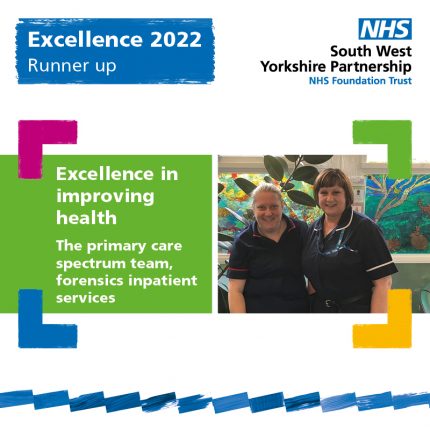 The primary care spectrum team, forensics inpatient services
The primary care spectrum team, forensics inpatient services
The primary care team provide a comprehensive physical health service to all inpatients across the forensic service. The team is made up of three dedicated individuals, a GP, and two members of nursing staff. They ensure that all service users receive a comprehensive health assessment on admission and continue to monitor health throughout the inpatient episode. Service users have a complex range of health needs and they work hard to ensure that they can access all aspects of health monitoring and review. The team, through their assertive approaches, reach out to this disadvantaged population and ensure they are able to access active interventions to improve their health.
“The team provide an individualised, persistent and consistent approach in reaching all of our forensic population.”
Mary McSharry
Practice governance coach
Highly commended
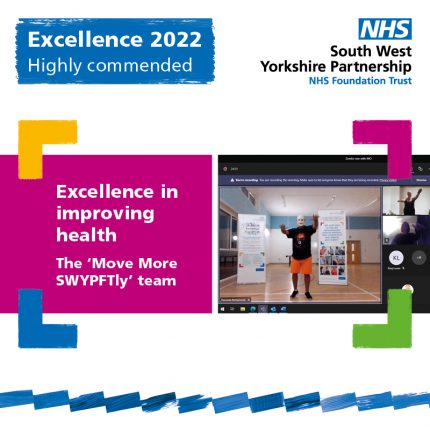 The ‘Move More SWYPFTly’ team
The ‘Move More SWYPFTly’ team
Iffath Hussain and Mohammad Navsarka have been pivotal to the success and momentum of the MoveMoreSWYPFTly campaign. They have co-produced with staff, networks and partner organisations a series of engaging, inclusive and fun activities designed to encourage staff, their families and Trust partners to become more physically active to support both their physical and mental health. Examples of their successful work include Bollywood and Latin dancing, virtual exercise classes including Zombiecise with Mo, walking challenges and the #24daysofFitmas campaign. Staff reported that the MoveMoreSWYPFTly sessions have helped to relieve their stress, improved their mood, boosted their energy levels and helped them feel more connected.
“It was a welcome addition to the end of the day when work had been full on to clear the mind and re-energise. Hopefully this has encouraged people to think healthy body, healthy mind and keep on moving more SWYPFTly.”
Alexis Ritchie
Equality and involvement project officer
Finalists
Calderdale learning disability health team, ‘health promotion roadshows for people with a learning disability’
Calderdale learning disability health team have set up health promotion roadshows to encourage conversations about health and to improve access to health resources for people with a learning disability. This is a nurse-led health opportunity where the team can offer advice and signpost service users for help with all aspects of their health and wellbeing. Health inequalities for people with a learning disability have always been disproportionately high, and further barriers in access to equal healthcare have been highlighted during the Covid19 pandemic. Timely access to good quality healthcare, as offered at the health promotion roadshows, is essential to prevent ill health and deaths amongst those with learning disabilities, and to improve general health and wellbeing.
“The healthcare workers listened to me.”
Service user
The physical health and wellbeing team, Barnsley peer support workers and volunteers
Over the last two years, the Barnsley peer support workers and volunteers have provided individual and group sessions in the community, working through incredibly tough conditions and achieving outstanding outcomes. COVID-19 sent its challenges, however this hasn’t stopped them. Between them they have run, walked and cycled thousands of miles to support others achieve their goals. The team have created a culture of change amongst a hard to reach population by facilitating physical activity sessions and encouraging individuals to become and stay active. This has led to earlier discharge from services, weight management, behaviour change, individuals returning to work, friendships and most importantly people living healthier lifestyles.
“This has made me feel a person again, motivated and I’m speaking to new people which I didn’t do before. I no longer feel like I want to die, instead I look forward to seeing everyone through the physical well-being team. It really has changed my life.”
Julia
Service user
Excellence in improving care
Improving the quality and experience of all that we do is one of our strategic objectives. This award will recognise an excellent project or initiative that identified an area where quality and/or experience needed to be improved, set objectives and delivered these. This category includes work undertaken by non-clinical teams that impacts on quality and experience of care.
Winner
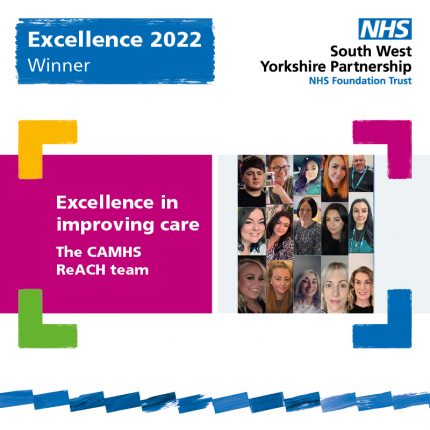 The CAMHS ReACH team
The CAMHS ReACH team
Feedback revealed to the team that people felt the service was difficult to navigate and led to people accessing the service through A&E, often not the appropriate place for children and young people with urgent mental health needs, and needed clear referral criteria and information for professionals. The development of the CAMHS ReACH Team has enabled children and young people in the area to receive a responsive assessment and provide outreach work at the right time and in the right place, avoiding hospital or A&E admissions or assessments, and aiding recovery in the community. The hard work of the team has ensured the new ways of working have been embedded within the service and that children and young people always remain at the centre of the team’s work.
“The ReACH Team have continued to develop and to provide new ways of supporting children and young people and their families when facing emotional and mental wellbeing difficulties. They support service users and also professionals from across Wakefield.”
Jo Rooney
Senior commissioning manager for children and young people
Runner up
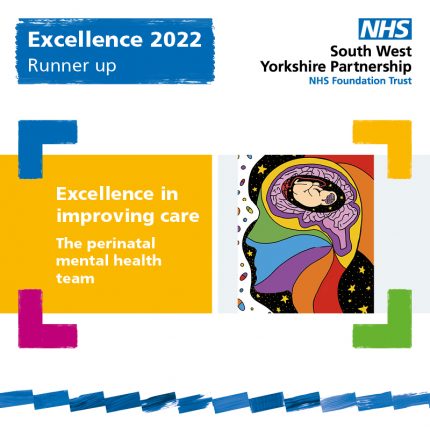 The perinatal mental health team
The perinatal mental health team
Working in a specialist team requires every member of staff to embrace developing their clinical skills alongside more familiar mental health skills. Staff are enthusiastic and motivated to attend training and learn new skills which allows them to provide specialist clinical interventions. The team work in a busy environment which has seen a significant increase in demand during the pandemic. Completely new roles have joined the team to support existing ones which has resulted in revamping and remodelling of pathways to improve care. The team receive amazing feedback from the women they work with which allows staff to know the work they do truly makes a difference and this shows in their dedication and drive to constantly provide the best service they can.
“Everyone was so wonderful, a special thank you were so helpful. After all these years of struggling I actually feel like I’ve got somewhere. The team is amazing and the best help I’ve had and I’m so grateful so thank you so much.”
Service user
Highly commended
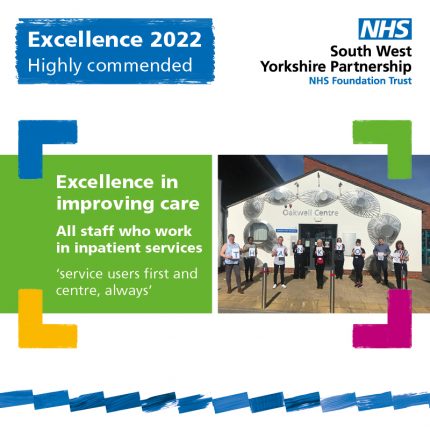 All staff who work in inpatient services, ‘service users first and centre, always’
All staff who work in inpatient services, ‘service users first and centre, always’
Throughout the pandemic, many services were able to make changes to their delivery in line with national restrictions. Even when they were uncertain of what lay ahead, inpatient staff came in to work and continued to provide care for service users. They advocated on their behalf, implemented new ideas to keep people in touch with loved ones, supported people who didn’t get visitors, tried to make sense of the national guidance for people who were frustrated, provided care for people isolating and infected, worked flexibly to help manage staffing absences – including moving across different sites to help staffing. People were put first and in the centre and services demonstrated that families and carers mattered.
“Things have been really challenging in our inpatient services. Our staff have shown care, compassion, flexibility and commitment to each other and to our service users. I can’t thank them enough.”
Carol Harris
Director of operations
Finalists
Pastoral care, ‘canine befrienders’
Canine befrienders are a group of trained dogs who work in partnership with their human volunteers in visiting the Trust’s inpatient wards to provide support to inpatients. They engage with patients in a number of different ways, e.g. stroking and petting the dogs, activities such as walking them on the lead, and one of the dogs attends a social group. As well as encouraging conversation and generally brightening up people’s day, they have a calming effect and create a warm and relaxed atmosphere on the wards. Their visits give patients something to look forward to as well as provide comfort and distraction from upsetting experiences and symptoms. They provide unconditional acceptance, boost self-esteem and confidence, and bring out kindness and compassion in people.
“If I hadn’t seen with my own eyes the powerful and positive impact the dogs can have on people I simply would never have believed it, somehow the dogs just seem to know who needs them. They just seem to have a way of making people smile!”
Angela Barker
Project co-ordinator
Wakefield dialectical behaviour therapy (DBT) team
The Wakefield dialectical behaviour therapy service was created in April 2020 to meet the needs of service users with emotionally unstable personality disorder, who have high levels of self-harming behaviours and suicidality, have not benefitted from other psychological therapies and typically require a high level of input from a range of services. The service offers an intensive, evidence-based treatment programme to enable service users to learn vital skills to regulate their emotions, manage crises and improve their relationships, so that they can stop their life-threatening behaviours and create a life worth living. The Wakefield DBT team treats service users as equals with valid points of view, empowering them to use DBT skills to cope more effectively with life’s challenges.
“Words cannot express how beneficial the DBT programme has been and continues to be for me. The professionals leading this programme are outstanding and exceptional in their field. I have felt nothing but support, no judgement.”
Service user
Partnership working excellence
Presented to a service or team who can evidence excellent partnership working, this award highlights the impact of working with others. It could be that your project or initiative needed internal partnership working or that you teamed up with external organisations or groups to achieve objectives.
Winner
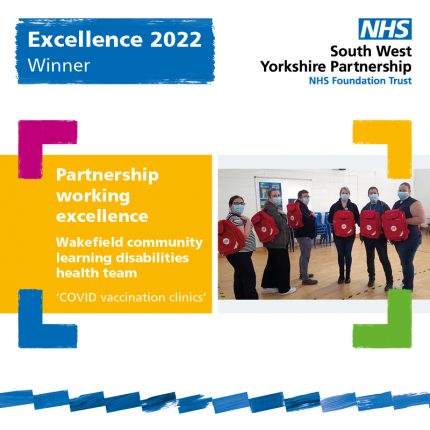 Wakefield community learning disabilities health team, ‘COVID vaccination clinics for people with learning disabilities’
Wakefield community learning disabilities health team, ‘COVID vaccination clinics for people with learning disabilities’
The team were approached by GPs who were struggling to vaccinate individuals on their learning disability register. Working with primary care and the CCG, the team put on vaccination clinics specifically for individuals with learning disabilities. They contacted individuals to complete tailored reasonable adjustments, such as offering vaccination in the car, in a quiet room, or with minimal staff in the clinic. The team held six clinics which were so successful that some individuals had vaccines for the first time ever. Inspired by this, the team opened up the offer to include flu vaccines and became the first team in the country to offer these. The team removed barriers and allowed people with learning disabilities to be successfully vaccinated and kept safe.
“Working at the COVID-19 vaccination clinic for those with learning disabilities really has been one of the best moments of my career. The work of the teams from all different areas of the NHS really helped make these sessions patient orientated and successful.”
Natalie Knowles
Primary care development manager, NHS Wakefield CCG
Runner up
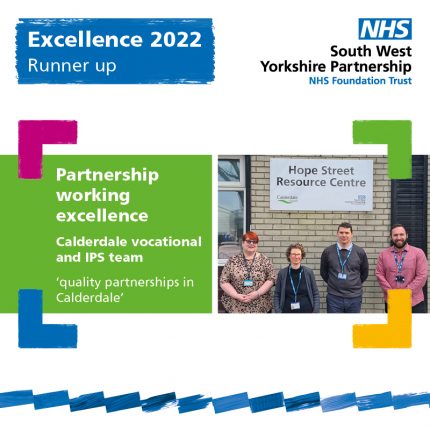 Calderdale vocational and IPS team, ‘quality partnerships in Calderdale’
Calderdale vocational and IPS team, ‘quality partnerships in Calderdale’
The Calderdale vocational and IPS team provide vocational interventions for service users accessing secondary care services in Calderdale. The IPS team, comprising of two employment specialists, uses the individual placement and support (IPS) model to enable individuals to achieve paid employment. The vocational team provides occupational therapist-led vocational support, receiving referrals directly from secondary care, offering a range of services including work retention, support into volunteering, education and training along with supporting ways of developing social functioning. The two services work in collaboration, not just with one another, but with secondary care services as a whole to deliver excellent vocational outcomes for the individuals they support.
“Karen has been a huge help to me and I am very grateful for her work. She helped me communicate my mental health needs to my employer, educated me on employee rights and what I was entitled to. Without her support, I may have left a job I enjoyed.”
Service user
Highly commended
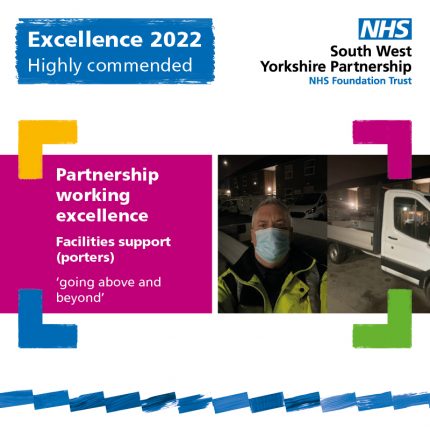 Facilities support (porters), ‘going above and beyond’
Facilities support (porters), ‘going above and beyond’
Throughout the pandemic, the porters have worked endless extra hours at very short notice, working days off and extra hours. They carry out their duties ensuring the smooth running of the hospital and all staff are willing to do anything to ensure the Trust’s services can continue. From delivering meals to all units, collecting and disposing of all waste, delivery of post, moving and heavy lifting, the work the porters do is essential to the functioning of the Trust. Every member of staff demonstrates the Trust’s values, from helping each other, colleagues and service users to making sure each job is completed efficiently.
“The work is carried out every day, 24 hours a day 365 days a year, there is always a porter on site to cover any emergencies, security or any jobs that arise. The smooth running of the hospital would not happen if it was not for this team.”
Stephen Greenhough
Night porter
Finalists
Calderdale early intervention in psychosis team, ‘shabby chic’
‘Shabby chic’ is an upcycling workshop which offers a fantastic opportunity for individuals to gain experience and develop skills, such as confidence and a good work ethic, whilst breathing new life into old furniture. The initiative has a strong focus on engagement, enhanced communication and friendship, breaking down barriers and tackling isolation. The project has led to access to training, education and employment, and reinforced people’s belief in themselves to successfully overcome challenges. Working alongside Halifax Opportunities Trust with a positive, flexible approach ensures the best possible service for individuals. Partnership working has allowed the service to move individuals on in a timely manner and improve the patient experience, enabling individuals to connect with others in the community. The initiative has also connected volunteers with opportunities that match their passions and skills.
The workshop means the world to me, it gives me a reason to get out of bed, a sense of purpose and making new friends. Volunteering also brings further benefits, a sense of achievement when passing skills on to clients, seeing them complete their goals.
Kim Sugden
Volunteer
Wakefield eating disorder team, ‘CAMHS and paediatric eating disorder pathway’
Wakefield CAMHS have seen a surge in referrals into the eating disorder team, not only in the volume of referrals but the presentation of the children and young people (CYP) being complex. The demand and severity of referrals has led to increased demands upon the children’s ward at Pinderfields. The eating disorder team identified that they needed more than ever to work closely with staff at the children’s ward to drive forward the development of a medical admission pathway, reducing variation in the admission process and defining the roles of each team and staff. The pathway has helped to improve ways of working and join up care for better outcomes for CYP, greatly improve working relationships with CAMHS and staff on the children’s ward at Pinderfields Hospital, and create forums for clinical queries to be addressed at appropriate levels and appropriate times.
“We have seen significantly improved communication and learning from regular multi-disciplinary meetings between the children’s ward and the eating disorders team.”
Dr Natasha de Vere
Consultant paediatrician, Mid Yorkshire Hospitals NHS Trust
Equality and involvement excellence
This award is for any service or team who can demonstrate excellence in supporting equality and diversity, and in involving people who use our services, carers or staff. Your entry should describe how you established relationships, supported or involved people from different backgrounds and how co-production, engagement and involvement contributed to improved outcomes.
Winner
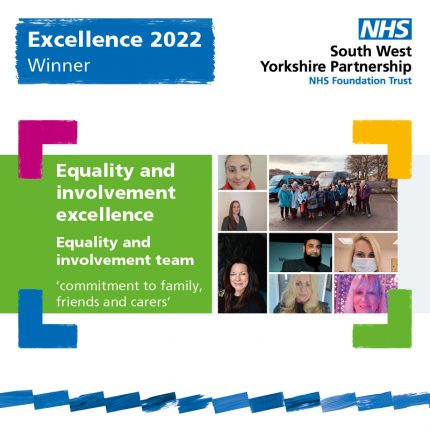 Equality and involvement team, ‘commitment to family, friends and carers’
Equality and involvement team, ‘commitment to family, friends and carers’
Following a successful NHS Charities Together funds application, the Trust appointed a carers project management officer to accelerate progress on our commitment to family, friends and cares. This work built on the carers charter and thriving staff carers network. The work progressed to embedding a carers passport for both unpaid and paid carers across our Trust and built a network of carers leads and recruitment of carers champions in teams and services. This work has not only increased the visibility of carers in the system but increased the voice too. With a now thriving staff network and partner network with direct links into carers on the ground, this agenda is much more visible.
“The Trust supports carers and they have helped me to know I have not been alone. I can reach out to them for help and support. They have made me feel I too am worth the help they give to us when we are down and struggling to cope.”
Unpaid carer
Runner up
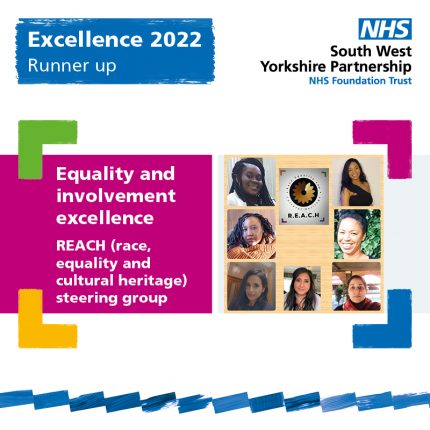 REACH (race, equality and cultural heritage) steering group
REACH (race, equality and cultural heritage) steering group
The REACH steering group have worked hard to build and bridge the gap with key staff groups, ensuring staff inclusion and taking steps to tackle inequality. They have ensured key events are commemorated, such as South Asian Heritage Month and Black History Month, worked in collaboration with the Trust to launch the equity guardians, organised fitness events to promote staff wellbeing, and arranged Q&A sessions to provide a safe space for staff to discuss the COVID-19 vaccine. Their work showed investment in staff, especially those from racially marginalised groups, to ensure their wellbeing was addressed. This has enabled them to provide outstanding physical, mental and social care, putting the person first, working well with relatives and carers and working to the best of their ability.
“The REACH steering group and network provides a space of safety and belonging for our racially marginalised workforce. In the words of Martin Luther King Jr – “Injustice anywhere is a threat to justice everywhere”.”
REACH steering group members
Highly commended
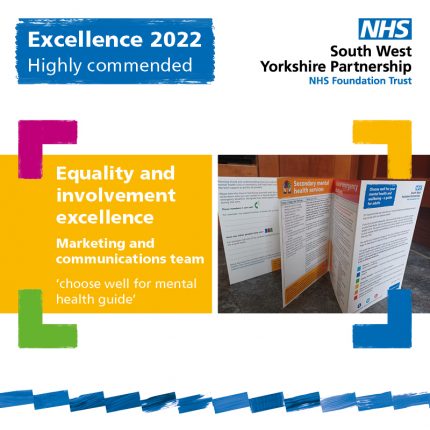 Marketing and communications team, ‘choose well for mental health guide’
Marketing and communications team, ‘choose well for mental health guide’
The communications team worked with relevant clinical services to launch a new guide and campaign to help people in Barnsley, Calderdale, Kirklees and Wakefield to ‘choose well’ when looking after their mental health and wellbeing. The Trust is one of the first Trusts nationally to develop a ‘choose well’ guide that focuses solely on mental health and wellbeing, which was produced collaboratively and launched via stakeholders. Information and support around mental health and wellbeing can sometimes be difficult to find, conflicting or even out of date; often leading to people being unsure about where to go for help, or what information they can trust. This was recognised by the communications team who created the ‘choose well for mental health’ guide to pull information together into one trusted place to help with these challenges.
“Thank you for taking such care over the leaflet and making it work for us, it means a lot that the Trust are putting their money where their mouth is in getting this leaflet right.”
Former service user
Finalists
Equality and involvement team, ‘capturing insight’
This is a project to systematically listen and capture the feedback of people who have used our services through partners and community contact. The approach provides a platform for governors, partners and Healthwatch to share with us the feedback from our communities and allows for the Trust to receive surveys or engagement feedback in one place. The report triangulates the insight into themes and ensures the Trust is always listening. By gathering and capturing feedback in our local communities the Trust can demonstrate it has an ear to the ground and is always open to hearing the views of the local population. It has resulted in increased connectivity with local communities, improvements in partner organisation relationships, and a bank of intelligence for future planning.
“Thank you for helping us share with you the informal things that are being said. We know people don’t always complain and often do not know how to share their thoughts and experiences informally. This approach helps us to systematically do this.”
Staff member
Healthwatch
FCAMHS, ‘BAME access and retention project’
On reviewing annual data, the Yorkshire and Humber FCAMHS service noted that the majority of referrals were for white British children. Considering the diversity in both the general population and in the youth secure estate, the team were curious to consider what could be done to increase the engagement of all children in the service to prevent access to secure hospital and the secure estate. The team launched a literature review: ‘What are the presenting barriers and gaps within services which affect BAME access and retention in to Forensic CAMH services and what measures can be taken to reduce such inequalities.’ This has now been shared nationally and the team are engaging with Bradford University to continue this work. By understanding barriers for children from a BAME background, the team can work to address these.
“Addressing barriers and inequalities in access to health services is essential for all services, for FCAMHS it can also ensure we understand a child’s needs and support avoidance from the custody system or secure hospital.”
Jo Barber
Acting general manager
Chair and chief executive’s award
Winner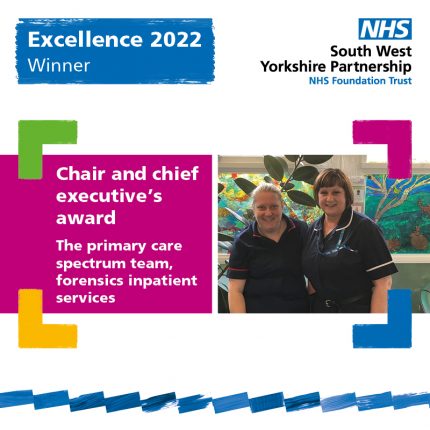
The primary care Spectrum team, forensics inpatient services
Back to the programme.
Page last updated on: